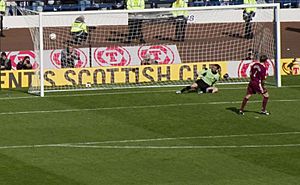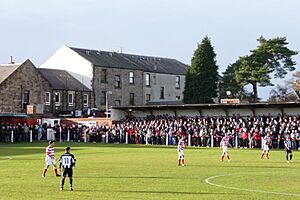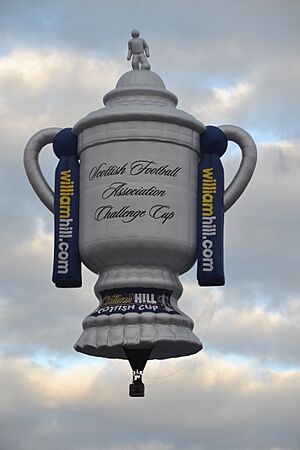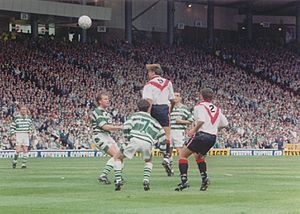Scottish Cup facts for kids
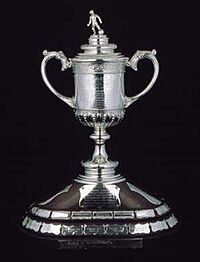 |
|
| Founded | 1873 |
|---|---|
| Region | Scotland England (1 team) |
| Number of teams | 130 (2024–25) |
| Qualifier for | UEFA Europa League |
| Current champions | Aberdeen (8th title) |
| Most successful club(s) | Celtic (42 titles) |
The Scottish Cup is a yearly football competition for men's clubs in Scotland. It's officially called the Scottish Football Association Challenge Cup. The first tournament was held in 1873–74. Many clubs can join, including all 122 teams that are full members of the Scottish Football Association (SFA). For sponsorship reasons, it's currently known as the Scottish Gas Men's Scottish Cup.
This competition is the second-oldest in football history, right after the English FA Cup. However, the Scottish Cup trophy itself is the oldest football trophy in the world! It was first given to Queen's Park when they won the first final in March 1874. The team that currently holds the cup is Aberdeen. They won the 2025 final by beating Celtic in a penalty shootout.
Contents
How the Scottish Cup Works
The tournament begins at the start of the Scottish football season in August. The Scottish Cup Final is usually the very last game of the season, played at the end of May. Teams join the competition at different stages. Lower-ranked clubs start in the early rounds, while top teams from the Scottish Premiership join later, in the fourth round in January.
The Scottish Cup is a knock-out tournament. This means if a team loses a game, they are out of the competition. In each round, teams are randomly paired up. The first team drawn gets to play at their home stadium. Each game lasts 90 minutes, plus any extra time added by the referee. The winner moves on, and the loser is eliminated.
Before the 2022-23 season, if a game ended in a draw in the early rounds, the teams would play again at the other team's stadium. If that replay was also a draw, they would have a penalty shoot-out. From the fourth round onwards, there were no replays. Instead, if a game was a draw, they would play 30 minutes of extra time, followed by a penalty shoot-out if needed. Since August 2022, most replays were removed. Now, if a game is a draw from Round One onwards, teams play extra time and then have a penalty shoot-out if there's still no winner.
For the 2022–23 tournament, 50 clubs played in the preliminary round. Teams from the Highland Football League and Lowland Football League started in the first round. Clubs from Scottish League Two joined in the second round. Teams from Scottish League One and Scottish Championship started in the third round. The 12 clubs from the Scottish Premiership entered in the fourth round.
Who Can Play?
Any club that is a full or associate member of the Scottish Football Association (SFA) can play in the Scottish Cup. This includes all teams in the Scottish Professional Football League (SPFL), Highland Football League, and Lowland Football League.
Clubs that are not full SFA members can still qualify. They can do this by winning one of the six regional leagues at tier 6 of the Scottish football system. Since 2007, winners of the Scottish Junior Cup can also qualify. And since 2015, winners of the Scottish Amateur Cup are also allowed to join.
Players must be officially registered with a club to play in the tournament. A player cannot play for more than one club in the same competition. Each team has eleven players on the field and up to seven substitutes. To play in the final match, a player must have also been registered for the semi-final with the same club. If a club uses a player who isn't properly registered, the club might be removed from the tournament.
Where Games Are Played
Before the semi-finals and final, the home team chooses where the match will be played, usually their own home stadium. If a game was a draw and needed a replay (in past seasons), the replay would be at the other team's stadium.
The semi-final games are played at a neutral venue, meaning a stadium that isn't the home ground of either team. This is usually Hampden Park in Glasgow. Sometimes, if Hampden Park isn't available (like when it was being fixed up or used for the 2014 Commonwealth Games), the semi-finals have been held at Celtic Park and Ibrox Stadium, which are also in Glasgow.
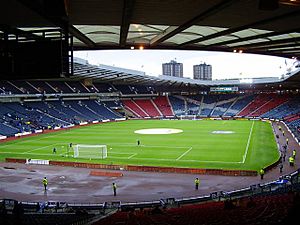
Hampden Park also usually hosts the final match of the tournament. This stadium has hosted most of the finals, including the very first one in 1874. Other stadiums in Glasgow hosted finals in the early years. The 1896 final was the only one played outside Glasgow, in Edinburgh. Hampden Park has held world records for the largest crowds at football games. For example, the 1937 final between Aberdeen and Celtic had 147,365 fans, which was a world record for a national cup final at the time and is still a European record.
Playing in Europe
Since Scotland is part of Union of European Football Associations (UEFA), the team that wins the Scottish Cup gets to play in big European competitions organized by UEFA. From 1960 to 1998, the Scottish Cup winners played in the UEFA Cup Winners' Cup. Now, the Scottish Cup winners qualify for the next season's UEFA Europa League.
Sometimes, the Scottish Cup winner has already qualified for a UEFA competition because of their high ranking in the Scottish Premiership. If this happens, the spot in the Europa League goes to the next highest-ranked team in the league that hasn't qualified yet, not to the team that lost the Scottish Cup final.
History of the Scottish Cup
The Scottish Football Association was started in 1873, and the Scottish Cup was created as a yearly competition for its member clubs. The very first Scottish Cup game was on October 18, 1873. Renton beat Kilmarnock 2–0 in that first match. In its early years, Queen's Park was very strong, winning the final 10 times in the first twenty years. Other successful teams back then included Vale of Leven, Dumbarton, and Renton.
In 1885, the biggest win in the tournament's history happened. Arbroath defeated Bon Accord by an amazing score of 36–0 in a first-round game. This was also the highest-scoring professional football game ever recorded.
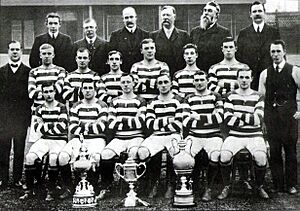
The Trophy
The Scottish Cup trophy is the oldest national trophy and the oldest football trophy in the world. It was made by a silversmith in London in 1873 and has been given to the winners since 1874. The trophy is made of solid silver, stands about 50 centimeters (20 inches) tall, and weighs about 2.25 kilograms (5 pounds).
The original trophy is kept at the Scottish Football Museum at Hampden Park. It is taken out once a year to be cleaned and presented to the winning team. After the award ceremony, the original trophy goes back to the museum. The winning team gets a copy of the trophy to keep, which is also used for promotions.
Team Successes
Winners by Club
A total of 34 clubs have played in the final, and 25 of them have won the competition. Celtic is the most successful club, with 42 wins from 62 final appearances. Rangers and Celtic have also lost in the final more than any other club, with 19 defeats each. The most recent winner is Aberdeen, who beat Celtic in the 2025 final.
| Club | Wins | Last final won | Runners-up | Last final lost | Total final appearances |
|---|---|---|---|---|---|
| Celtic | 42 | 2024 | 19 | 2025 | 62 |
| Rangers | 34 | 2022 | 19 | 2024 | 54 |
| Queen's Park | 10 | 1893 | 2 | 1900 | 12 |
| Aberdeen | 8 | 2025 | 9 | 2017 | 17 |
| Heart of Midlothian | 8 | 2012 | 9 | 2022 | 17 |
| Hibernian | 3 | 2016 | 12 | 2021 | 15 |
| Kilmarnock | 3 | 1997 | 5 | 1960 | 8 |
| Vale of Leven | 3 | 1879 | 4 | 1890 | 7 |
| St Mirren | 3 | 1987 | 3 | 1962 | 6 |
| Clyde | 3 | 1958 | 3 | 1949 | 6 |
| Dundee United | 2 | 2010 | 8 | 2014 | 10 |
| Motherwell | 2 | 1991 | 6 | 2018 | 8 |
| Third Lanark | 2 | 1905 | 4 | 1936 | 6 |
| Falkirk | 2 | 1957 | 3 | 2015 | 5 |
| Dunfermline Athletic | 2 | 1968 | 3 | 2007 | 5 |
| Renton | 2 | 1888 | 3 | 1895 | 5 |
| St Johnstone | 2 | 2021 | — | — | 2 |
| Dumbarton | 1 | 1883 | 5 | 1897 | 6 |
| Dundee | 1 | 1910 | 4 | 2003 | 5 |
| Airdrieonians (1878) | 1 | 1924 | 3 | 1995 | 4 |
| East Fife | 1 | 1938 | 2 | 1950 | 3 |
| Greenock Morton | 1 | 1922 | 1 | 1948 | 2 |
| Partick Thistle | 1 | 1921 | 1 | 1930 | 2 |
| Inverness Caledonian Thistle | 1 | 2015 | 1 | 2023 | 2 |
| St Bernard's | 1 | 1895 | — | — | 1 |
| Hamilton Academical | — | — | 2 | 1935 | 2 |
| Ross County | — | — | 1 | 2010 | 1 |
| Queen of the South | — | — | 1 | 2008 | 1 |
| Gretna | — | — | 1 | 2006 | 1 |
| Albion Rovers | — | — | 1 | 1920 | 1 |
| Raith Rovers | — | — | 1 | 1913 | 1 |
| Cambuslang | — | — | 1 | 1888 | 1 |
| Thornliebank | — | — | 1 | 1880 | 1 |
| Clydesdale | — | — | 1 | 1874 | 1 |
Winning Multiple Trophies
When a club wins the Scottish Cup and also becomes the Scottish league champions in the same season, it's called a "double". Only three clubs have done this. Celtic has won the double 21 times, and Rangers has done it 18 times. Aberdeen is the only other Scottish club to achieve this, in 1983–84.
Since the Scottish League Cup started in 1947, clubs can win a "treble" by winning all three major domestic trophies in one season. Celtic has done this eight times, which is a world record. They even won four trebles in a row from 2016–17 to 2019–20, which had never happened before.
Big Surprises in the Cup
Some clubs are famous for beating much stronger teams in the tournament, even when they are not expected to win. These are called "cup shocks."
In 1938, Division Two club East Fife won the tournament. They beat Division One club Kilmarnock. This was the first time a team from outside the top league won the trophy. Hibernian became the second second-tier team to win the cup in the 2016 final, beating Rangers. Only one other non-top-tier club has won: non-league Queen's Park beat Celtic in the 1893 final.
Many other lower-league clubs have reached the final but lost. These include Dumbarton, Kilmarnock, Airdrieonians, Falkirk, Gretna, Queen of the South, Ross County, Hearts, and Inverness Caledonian Thistle.
There have been many surprising results in earlier rounds too.
- In 1959, Dundee was knocked out by Highland League club Fraserburgh.
- In 1967, Berwick Rangers beat defending champions Rangers in the first round.
- In 2000, Celtic lost to First Division club Inverness Caledonian Thistle. This led to the famous newspaper headline "Super Caley go ballistic, Celtic are atrocious."
- In 2020–21, Highland League club Brora Rangers knocked out Championship leaders Heart of Midlothian.
- In 2021–22, cup holders St Johnstone were knocked out by League Two (fourth tier) club Kelty Hearts.
- In 2022–23, Drumchapel United (a seventh-tier team) beat League One side Edinburgh. This was a huge upset, with 62 league places between them. Later that season, Darvel (sixth tier) knocked out Premiership club Aberdeen, with 56 places separating them.
- In 2025, Rangers were surprisingly eliminated in the 5th round by second-tier Queen's Park. This was the first time Rangers lost a home cup game to a lower division team in their history.
Other notable upsets include Stenhousemuir's win against Aberdeen in 1995, and Albion Rovers' defeat of Motherwell in 2013.
Sponsorship and Names
The Scottish Cup has had sponsors since 1983. A sponsor can change the name of the competition. The tournament gets money from these deals, even though it ran for over 100 years without a main sponsor.
| Period | Sponsor | Name |
|---|---|---|
| 1873–1982 | No sponsor | Scottish Cup |
| 1983–88 | Scottish Health Education Group | Scottish Cup |
| 1988–89 | No sponsor | Scottish Cup |
| 1989–2007 | Tennent Caledonian Breweries | Tennent's Scottish Cup |
| 2007–08 | No sponsor | Scottish Cup |
| 2008–10 | Scottish Government | Homecoming Scottish Cup in 2008–09 and the Active Nation Scottish Cup in 2009–10 |
| 2010–11 | No sponsor | Scottish Cup |
| 2011–20 | William Hill | William Hill Scottish Cup |
| 2020–23 | No sponsor | Scottish Cup |
| 2023–present | Scottish Gas | Scottish Gas Men's Scottish Cup |
The Scottish Health Education Group was the first sponsor in 1983. Their deal was worth about £200,000, which was a lot for Scottish football at the time. This partnership was good for promoting healthy living through football.
In 1989, Tennent Caledonian Breweries became the sponsor. This caused some discussion about alcohol companies sponsoring sports, especially after problems at the 1980 Scottish Cup Final led to alcohol being banned at Scottish sports events. Despite this, the partnership was very successful and lasted 18 years. The SFA received about £25 million from this deal.
The Scottish Government and businessman Willie Haughey sponsored the cup from 2008 to 2010. The 2008–09 competition was called the Homecoming Scottish Cup to promote tourism in Scotland. The 2009–10 competition was called the Active Nation Scottish Cup to encourage healthy living through football.
Watching the Games
Scottish Cup matches are shown live on TV by BBC Scotland within Scotland. Outside Scotland, in the rest of the United Kingdom, they are broadcast by Premier Sports.
BBC Radio Scotland provides radio coverage, including live commentary for many games. Other radio stations like BBC Radio nan Gàidheal and BBC Radio 5 Live also cover some matches.
The Scottish FA also sells rights for other countries to show the games. In Australia, the Scottish Cup is shown on Network 10 and Paramount+. In the United States, ESPN broadcasts the tournament.
The Scottish Cup Final is one of the special events that must be shown live on free-to-air TV in Scotland.
See also
 In Spanish: Copa de Escocia para niños
In Spanish: Copa de Escocia para niños
- Football records in Scotland
- List of Scottish Cup winning managers
- Scottish Women's Cup
 | Sharif Bey |
 | Hale Woodruff |
 | Richmond Barthé |
 | Purvis Young |


